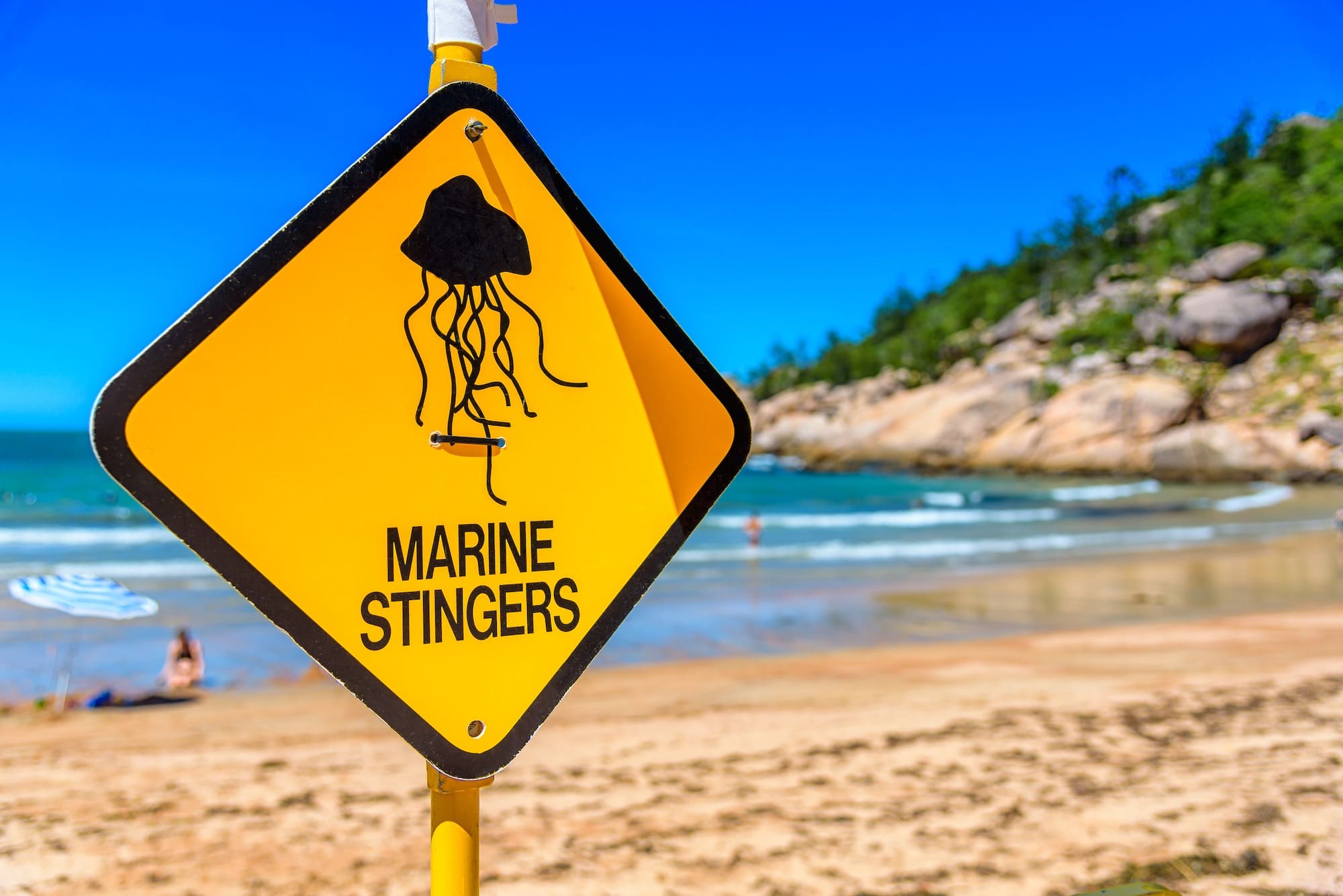The coastline of Australia, particularly the tropics, holds some perils for the unwary. Box jellyfish or sea wasp (Chironex fleckeri), bluebottles, stonefish, stingrays, blue ringed octopus and cone snails are just some of the ‘nasties’ to watch out for whilst in the water.
Box jellyfish or sea wasp
These creatures are found in tropical Australian waters and stings from box jellyfish can be fatal. First aid for stings includes the following:
- Domestic vinegar should be poured liberally over any adhering tentacles to inactivate the stinging cells (nematocysts) as soon as possible. Flood the area with vinegar for at least 30 seconds.
- If vinegar is not available, wash the area well using sea water (not fresh water) and pick off tentacles (this is not harmful to the rescuer).
- Dial 000 for an ambulance and seek help from a lifeguard.
- Make sure patient does NOT move.
- A cold pack or ice in a sealed, dry plastic bag may help relieve pain. Take care not to get fresh water on the area as it could activate further stinging cells.
- Artificial respiration and cardiac massage (cardiopulmonary resuscitation – CPR) may be required.
- There is antivenom is available, and is recommended for all but minor stings.
Note: The use of vinegar for jellyfish stings is to prevent the firing of undischarged stinging cells and the injection of more venom. Vinegar will not decrease pain or lessen the effects of the venom.
Never try to substitute methylated spirits or alcohol, which will cause the nematocysts to discharge and worsen the sting.
Signs and symptoms of box jellyfish or sea wasp sting
Immediate, excruciating pain. Whip-like sting marks on the skin – redness and swelling.
Also nausea, vomiting, sweating, restlessness, headache and collapse. May stop breathing and go into cardiac arrest within a few minutes of being stung.
Bluebottle or Portuguese man o’war

Although painful, bluebottle stings do not usually cause any lasting damage. First aid for bluebottle stings consists of the following.
- Vinegar is NOT recommended.
- Remove any tentacles with tweezers, forceps or fingers (this is not dangerous to the rescuer; you may experience a harmless prickling feeling).
- DO NOT rub the area.
- DO NOT wash off with fresh water — use sea water.
- Immerse the affected area in hot water (no hotter than the rescuer can comfortably tolerate) for 20 minutes to relieve pain.
- If pain is not relieved by heat, or hot water is not available, stings may respond to ice packs or anaesthetic creams or lotions.
- For persistent or generalised pain, or if the sting area is large or involves sensitive areas, call an ambulance and seek assistance from a lifeguard if available.
Irukandji syndrome
Irukandji syndrome can develop in about 30 minutes after being stung by some small and medium-sized jellyfish. It can be fatal. First aid for Irukandji syndrome includes the following.
- Call for medical assistance, either via a lifeguard or dial 000 for an ambulance.
- Liberally douse the stung area with vinegar.
- The person must be taken to hospital for pain relief and treatment of symptoms.
Signs and symptoms of Irukandji syndrome
- If you’re lucky, the sting may be mild or not painful, this may be because the jellyfish may be too small.
- Symptoms include severe low back pain, generalised cramping pain, vomiting, sweating, difficulty breathing, restlessness and anxiety.
- Dangerously high blood pressure may develop.
For more information on all bites and stings, please see our article here.

